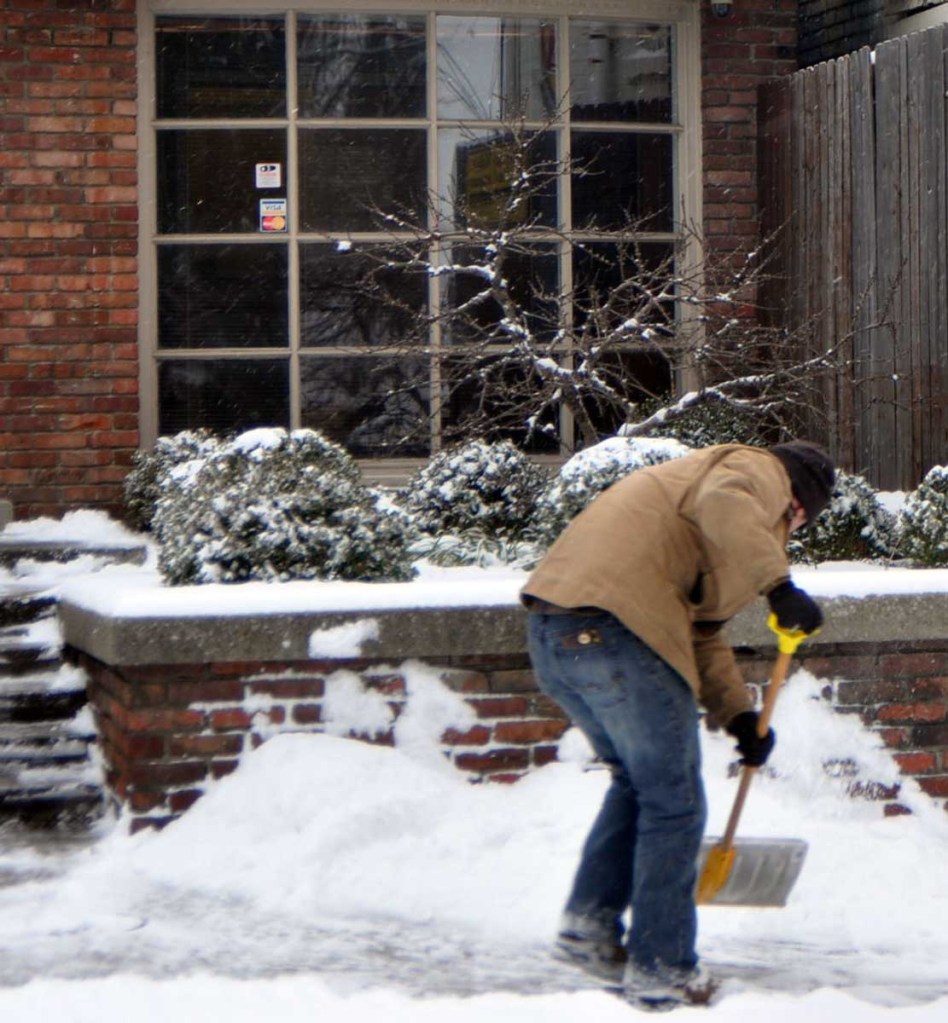Winter presents increased heart health hazards, experts say
Published 8:30 am Wednesday, December 14, 2016

- A man scrapes snow from a sidewalk in downtown Richmond, Kentucky, after a large snow storm last winter blanketed the city.
While it might seem like an old excuse for a dreaded task during the colder months, medical experts agree that activities such as shoveling snow could actually be hazardous to heart health.
A 2010 study published in The BMJ found cold weather may increase the risk of heart attacks, even in healthy individuals. In fact, scientists found that every 1.8 degree reduction in temperature on a single day was associated with about 200 additional heart attacks.
This December, health professionals are encouraging the public to educate themselves about heart health for the winter months. Due to physical and environmental factors, Americans are more than 30 percent likely to suffer a heart attack during the winter, which is why it is important to protect heart as temperatures drop.
“The winter months can put even a healthy person at risk for a heart attack or other heart health problems,” Donny Hardy, MD, of KentuckyOne Health Primary Care Associates in Berea, Kentucky, said. “To help protect yourself and those around you, be aware of the warning signs of heart attack, which include pressure, tightness or pain in the chest or arms, nausea, shortness of breath, cold sweat, lightheadedness and fatigue.”
Medical experts claim frigid weather, like conditions predicted in the coming days and weeks, can increase heart rate and blood pressure due to exposure of low temperatures, which cause blood vessels to narrow, requiring more pressure to force blood through narrowed veins and arteries.
Increased blood pressure greatly increases risks of having a heart attack and stroke.
Hormonal changes that come with the colder weather can also make blood more conducive to clotting. Cortisone levels in the wintertime fluctuate with the colder weather, causing platelets to become “sticky.” These sticky platelets allow clots to form more easily. As the arteries constrict due to cold air, blockages increase.
Winter physical activities — such as shoveling snow or exercising in the cold — cause blood vessels to constrict and raise blood pressure as well, further straining the heart.
During the winter, doctors say the heart has to work much harder to keep the body warm in the cold. It’s one of the reasons frequent outdoor runners find that their performance levels dip in the wintertime — their lungs and heart are straining much harder than usual.
With heart rate and blood pressure already elevated due to the low temperatures, additional exertion can cause blood clots to form and provoke coronary artery spasms.
It’s not just the near-artic temperatures that can compromise heart health; doctors say added holiday stress can also lead to heart problems. Built-up stress from budget concerns, holiday shopping hustle and bustle and traveling can strain an already overworked heart.
In addition to stress, medical experts claim many people experiencing heart-related issues are more likely to delay getting treatment during the month of December because the do not wish to disrupt holiday festivities or take longer to find medical care away from home while traveling and visiting out-of-town relatives.
Overindulgence during the holidays also puts heart health in danger. At family gatherings and holiday parties, people tend to consume alcohol and eat more than usual, including unhealthy foods that are high in sodium. Busy schedules due to holiday engagements cause people to neglect their exercise routines, which can put more strain on the heart.
“Many people let their health take a backseat during the winter, but it’s actually even more important to ensure your heart is healthy during the colder months,” Hardy said. “Try to maintain a healthy lifestyle throughout the holiday season, and talk to your primary care provider about ways to protect your heart during the colder months.”
Barker writes for the Richmond, Kentucky Register.
- In order to stay healthy during the winter, it is important to maintain a balanced diet, including at least five servings of fruits and vegetables per day.
- A minimum of 75 minutes of safe exercise per week is recommended for heart health.
- When shoveling snow or exercising outdoors, remember to dress warmly to keep blood flowing, and warm up muscles prior to doing physical activity. Do not drink alcohol before or immediately after shoveling snow, as this can increase your risk for heart attack.
- If you or someone near you is presenting symptoms of a heart attack, call 911 immediately. Then, if you are able, perform hands-only CPR by placing your hands on the victim’s chest and administering compressions hard and fast, 100 times per minute, in the center of the chest. Don’t stop until help arrives.





